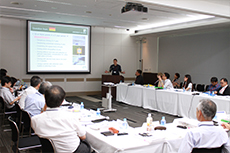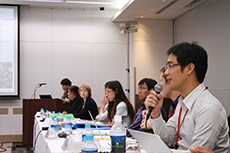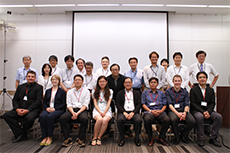International Exchange
DepartmentAbout IATSS
In our interdisciplinary efforts aimed at safer transportation and a worry-free future, we are proactively arranging exchanges with various foreign organizations and experts.
We cooperate with members invited from overseas and honorary members from abroad. We also provide young researchers with opportunities for interdisciplinary and international research activities and a chance to present their research results, regardless of nationality. We also provide assistance to related overseas research organizations.
International Workshop 2014
As a project of the International Exchange Department Planning Committee, for FY2013, we compiled a collection of reports on Traffic Safety Education and Information Campaign Activities in each country, authored by young researchers from 8 countries. For the following FY2014, in August, we held an International Workshop to discuss the contents of the reports and exchange views among authors and with IATSS members. Further, the authors polished the report contents by reflecting the discussions at the workshop, and we released the final version of the report (English/Japanese) in March.
Topics of discussion: Excerpts
- ■License renewal system
-
- While good drivers are required to take relatively short classes, penalties are being enforced to ensure longer-term education for violators. (Japan attendee)
- To save time and money, Taiwan uses a system that simplifies the renewal procedures for drivers. (Taiwan author)
→Incentives for encouraging good drivers (such as a simplified license renewal procedures) have merit, but we also need to make sure that we use each renewal as an opportunity to evaluate whether drivers are fit to drive. (Taiwan author) - As violations and accidents are relatively rare, it would not make much sense to modify training periods based on such conditions. (UK author)
- ■Elderly drivers
-
- Classes are generally the same for all participants regardless of past violation history, but some changes need to be made in light of the reduced performance levels that come along with advanced age. (Japan attendee)
- Considering the various processes of aging, it would be a good idea to develop a comprehensive examination tool for identifying elderly drivers’ needs and providing assistance (such as safety education courses) accordingly. (Taiwan author)
- The need for a license renewal system for elderly drivers has been up for debate in Germany for some time now. If the government decides to implement a renewal system, it would be worth noting that a research study with elderly drivers showed a visible effect in improved driving skills after participating in in-car-driving classes. (Germany author)
- Many elderly drivers in Finland voluntarily stop driving, making the risk of accidents attributable to elderly drivers relatively small.
However, drivers often start using bicycles after giving up driving; this creates concerns about the elderly becoming victims in traffic accidents and the possibilities of other new problems. (Finland author)
- ■Traffic safety (for children)
-
- In Germany, the Road Safety Council provides the framework for road safety campaigns. The German Federal Highway Research Institute published a guide for setting up school route maps.
- Given its frequent natural disasters, Japan not only creates school-commute maps but also makes disaster safety a central part of its map development efforts. (Japan attendee)
- Some areas of the UK have implemented “walking bus” programs in which uniformed volunteers accompany children on their commutes to school in hopes of ensuring safety, but there are concerns that walking buses deprive children of opportunities to learn their responsibilities for their own safety. (UK author)
- A checklist created by the Jing Chuan Child Safety Foundation is offered to schools, which can be used to examine their surrounding road environments and the safety of children’s commuting paths.
Schools also cooperate with selected stores along the commute paths to provide children with assistance in case of emergency. (Taiwan author) - In an effort to reduce traffic accidents in the early age group, the Indonesian National Traffic Police has created several traffic parks in major cities as education and training centers for children. (Indonesia author)
- ■Traffic safety (bicycles)
-
- Due to the lack of education on traffic rules, etc., for bicycles in Japan, bicycle accidents have been on the rise in recent years. (Japan attendee)
- China is trying to educate bicycle users through TV and public media outlets, but there are no penalties in place. (China author)
- Although there is no specific bicycle-related education system in Germany, as is the case for the car driving license system, the police provide cycling guidance to 9- and 10-year-old students in elementary schools. Many accidents in Germany tie back to infrastructure problems; with better infrastructure for bicycles and good sight relations, there tend to be fewer bicycle accidents. (Germany author)
- In Finland, which has a Road Traffic Act for bicycles, instructors provide education—albeit with some variation in teaching methods—at elementary schools and other locations. (Finland author)




